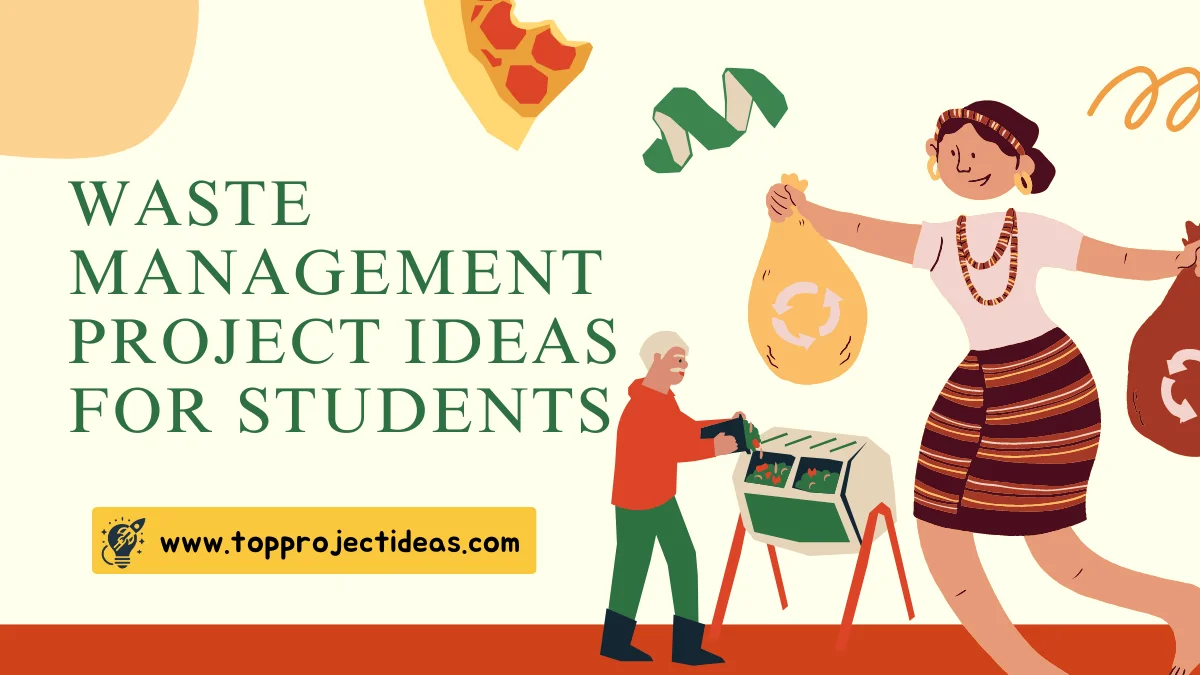Waste management is an essential topic in today’s world. With increasing amounts of waste, it is crucial to learn how to manage it responsibly.
This blog will help students understand the importance of waste management, how to choose a good project idea, and provide examples of exciting projects.
Let’s dive in!
Must Read: 27+ Science Investigatory Project Ideas For High School
Benefits of Doing a Waste Management Project
Here are the top benefits of doing a waste management project:
- Environmental Awareness: Students learn about the impact of waste on the environment.
- Problem-Solving Skills: Working on these projects enhances critical thinking and problem-solving abilities.
- Community Impact: These projects can benefit the local community by promoting better waste practices.
- Practical Knowledge: Students gain hands-on experience and practical knowledge that can be applied in real life.
- Innovation and Creativity: Encourages innovative thinking and creativity in solving waste problems.
How to Choose a Good Waste Management Project Idea?
Choosing the right project idea is crucial. Here are some tips:
- Interest and Passion: Pick a topic that interests you. It will keep you motivated.
- Local Relevance: Consider the waste issues in your community. Projects that address local problems can have a significant impact.
- Feasibility: Ensure the project is doable with the resources and time available.
- Educational Value: Choose a project that teaches you something new and enhances your knowledge.
- Impact: Think about your project’s potential positive impact on the environment and community.
Top 89+ Waste Management Projects for Students (2024)
Here are the top waste management projects for students from beginner to advanced levels:
Beginner Level Waste Management Projects for Students
Social Media Campaigns
- Create posts about recycling facts.
- Share tips on reducing plastic use.
- Promote local clean-up events.
- Post weekly environmental quotes.
- Highlight eco-friendly products.
- Share stories of environmental activists.
- Promote carpooling and public transport.
- Create infographics on energy saving.
- Share DIY upcycling projects.
- Post about the importance of water conservation.
School-Based Initiatives
- Start a recycling program at school.
- Organize a waste audit at school.
- Set up compost bins in the school cafeteria.
- Create a green club.
- Hold a poster competition on waste management.
- Organize a clean-up day.
- Start a garden club.
- Host a clothing swap event.
- Introduce meatless Mondays in the cafeteria.
- Create a recycling guide for students.
Community Involvement
- Volunteer at a local recycling center.
- Organize a neighborhood clean-up.
- Distribute flyers on waste reduction tips.
- Create a community compost site.
- Host a garage sale to promote reuse.
- Plant trees in the community.
- Start a book exchange program.
- Organize a used electronics collection.
- Host a workshop on DIY crafts from waste.
- Create a community garden.
Intermediate Level Waste Management Projects for Students
Advocacy and Policy
- Write letters to local government officials about waste issues.
- Create petitions for better waste management policies.
- Advocate for plastic bag bans.
- Promote policies for composting programs.
- Campaign for improved recycling facilities.
- Organize town hall meetings on waste issues.
- Develop a proposal for school recycling programs.
- Lobby for better waste segregation laws.
- Advocate for deposit return schemes for bottles.
- Campaign for the reduction of single-use plastics.
Educational Workshops and Campaigns
- Host workshops on composting.
- Conduct seminars on sustainable living.
- Organize eco-friendly craft workshops.
- Hold educational sessions on e-waste.
- Create a documentary on local waste issues.
- Develop educational materials on waste reduction.
- Organize a film screening of environmental documentaries.
- Conduct a survey on waste habits and present the findings.
- Start a blog on waste management tips.
- Create an educational video series on waste reduction.
Innovative Projects
- Design a mobile app for waste segregation.
- Create eco-friendly packaging solutions.
- Develop a product from recycled materials.
- Start a school garden using compost from food waste.
- Build a community recycling kiosk.
- Create a DIY tutorial channel for upcycling.
- Design an awareness campaign using virtual reality.
- Develop a game to teach kids about waste management.
- Create a mobile recycling unit.
- Design a smart bin that sorts waste automatically.
Advanced Level Waste Management Projects for Students
Research and Analysis
- Conduct a research project on the impact of waste on marine life.
- Analyze the effectiveness of local recycling programs.
- Study the economic benefits of waste reduction.
- Research alternative materials to plastic.
- Investigate the health impacts of waste incineration.
- Conduct a life-cycle analysis of common waste products.
- Study the impact of e-waste on developing countries.
- Research waste-to-energy technologies.
- Analyze consumer behavior towards waste.
- Investigate the potential of zero-waste cities.
Technology and Innovation
- Develop waste management software.
- Create a prototype for a waste-to-energy device.
- Innovate a new recycling technology.
- Develop an AI system for waste sorting.
- Design a water filtration system using recycled materials.
- Create a biodegradable product to replace plastic.
- Develop a drone for waste collection in hard-to-reach areas.
- Innovate a solution for space waste management.
- Create a blockchain system for waste tracking.
- Develop a robotic system for landfill waste sorting.
Large-Scale Projects
- Start a non-profit organization focused on waste reduction.
- Develop a community-wide composting program.
- Implement a school-wide zero-waste initiative.
- Organize a city-wide recycling drive.
- Create a regional e-waste collection program.
- Launch a campaign to eliminate single-use plastics in your city.
- Develop a partnership with local businesses for waste reduction.
- Start a project to convert food waste into biofuel.
- Implement a sustainable packaging initiative in local stores.
- Create a program to educate local farmers about composting.
By engaging in these projects, students can significantly impact waste management and environmental sustainability. Start with simpler projects and gradually take on more complex initiatives as your knowledge and skills grow. Good luck!
Challenges in Waste Management Project Ideas for Students
Students tackling waste management projects might face several challenges, including:
- Lack of Awareness: Many people are unaware of the importance of waste management and proper disposal methods.
- Insufficient Infrastructure: Inadequate recycling, composting, and waste collection facilities can hinder effective waste management.
- Funding Issues: Limited financial resources can make implementing and maintaining waste management systems difficult.
- Regulatory Barriers: Complex regulations and lack of enforcement can complicate waste management efforts.
- Behavioral Resistance: Changing people’s habits and encouraging sustainable practices can be challenging.
- Technological Constraints: Access to advanced waste processing and recycling technology may be limited.
- Data Collection: Gathering accurate data on waste generation and disposal can be difficult but is essential for effective planning.
5 Case Studies of Successful Waste Management Projects
Here are five successful waste management projects from around the world:
- Indore, India: Indore transformed from struggling with waste to becoming one of India’s cleanest cities. Key factors in their success include:
- Public awareness campaigns to educate residents about segregating waste at home.
- Door-to-door waste collection system focused on efficiency.
- Innovative solutions like using rickshaws for waste collection in narrow lanes.
- Modern waste management infrastructure, including transfer stations and sanitary landfills.
- San Francisco, USA: San Francisco aimed for zero waste by 2020 and pioneered composting and diversion programs. Their approach includes:
- Mandatory composting and recycling programs for residents and businesses.
- Bans on single-use plastics and non-recyclable materials.
- Investment in composting facilities and a strong recycling infrastructure.
- Educational campaigns promoting responsible waste management.
- Guangzhou, China: China’s Guangzhou city tackled its waste problem by:
- Building advanced waste-to-energy plants converting waste into electricity.
- Strict waste sorting regulations to provide proper fuel for these plants.
- Reducing reliance on landfills and generating clean energy.
- Hawaii’s RecycleNet Program: Hawaii, faced with unique challenges due to its remoteness, implemented the RecycleNet program, which involves:
- Establishing recycling centers across islands.
- Partnering with businesses to manage specific waste streams like construction debris and electronics.
- Educational programs aimed at reducing waste generation.
- Dehradun, India: Dehradun addressed plastic waste through the “Know Your Plastics” project:
- Community clean-up events to collect plastic waste.
- Educating residents about proper waste segregation, particularly focusing on different types of plastics.
- Partnering with waste collectors and recyclers to ensure proper processing of plastics.
These case studies demonstrate diverse strategies for successful waste management, emphasizing public participation, innovative solutions, and comprehensive approaches, including waste reduction, recycling, and responsible disposal.
Each project adapts to local conditions and resources, showcasing effective ways to tackle waste challenges globally.
Additional Tips for a Successful Project
- Collaborate: Work with classmates, teachers, or community members. Collaboration can bring in new ideas and make the project more effective.
- Document Your Work: Keep a record of your progress. Take photos, write reports, and make presentations to share your findings.
- Seek Guidance: Don’t hesitate to ask for help from teachers or experts in the field.
- Be Creative: Think outside the box. Innovative solutions can make a big difference.
- Share Your Results: Present your project to your school or community. Sharing your work can inspire others to take action.
Wrap Up
Waste management projects are a fantastic way for students to positively impact the environment and their communities.
These projects help develop valuable skills, raise awareness, and promote sustainable practices.
You can make a meaningful difference by choosing a project that interests you and is relevant to your community.
So, pick a project idea, get started, and be a part of the solution to waste management challenges!
FAQs
What is waste management 5 points?
Waste management involves a series of steps to handle and minimize waste efficiently. These steps typically include refusing, reducing, reusing, repurposing, and recycling.
Each step must be meticulously followed for the plan to achieve its maximum effectiveness in waste reduction and environmental conservation.
What is the zero waste program?
The zero waste program is a comprehensive approach designed to minimize waste generation and maximize recycling efforts. It focuses on reducing consumption and ensuring that products are manufactured to be reused, repaired, or recycled.
The goal is to keep products and materials circulating in the economy for as long as possible, thereby minimizing waste sent to landfills or incinerators.

I’m Isla Campbell, a creative and passionate professional with over 8 years of experience in education and project-based learning. I enjoy coming up with smart, helpful project ideas that inspire students and support teachers. I’m skilled at doing research, finding what works best, and turning ideas into successful learning experiences. I also love working with others, staying organized, and making sure every project is done well and on time. Let’s team up to turn great ideas into real results!
